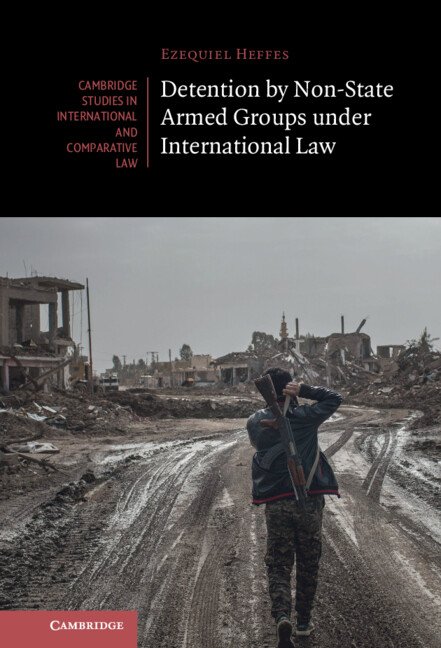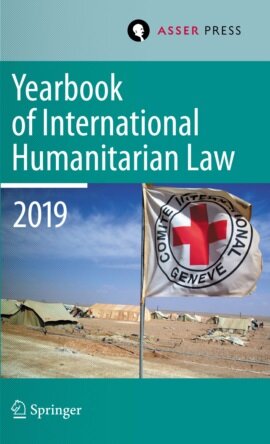
Publications
Considerations and Guidance
for the Humanitarian Engagement with Religious Leaders
Considerations and Guidance for the Humanitarian Engagement with Religious Leaders is the main operational project output of the Generating Respect Project.
The report was launched in Geneva on 16 January 2023 during the conference Engaging Religious Leaders to Generate Respect for Humanitarian Norms in Armed Conflict.
The event was co-organised by the Delegation of the European Union to the UN and other international organisations in Geneva,
the Permanent Mission of Switzerland to the UN and other international organisations in Geneva, and the University of York.

Books & articles
Ezequiel Heffes, Detention by Non-State Armed Groups under International Law (Cambridge University Press, 2022)
During armed conflict, non-State armed groups deprive individuals of their liberty. While this is not a new phenomenon, its pervasiveness is reflected by recent examples in Colombia, Libya, Syria, Ukraine, Mali and the Democratic Republic of the Congo. Yet, examining these activities goes beyond its mere acknowledgment. It involves questions concerning their legality and the non-State armed groups' motivations when depriving individuals of their liberty. Drawing on his personal experiences while working for various humanitarian organizations, Ezequiel Heffes aims at elucidating how international law can be used as a protective tool in relation to individuals placed in detention by non-State armed groups. Based on case studies of selected groups and a normative and doctrinal analysis, he proposes minimum humanitarian principles applicable to those situations. By addressing a contemporary issue that touches upon a number of legal regimes, this study makes a valuable contribution to the law applicable in armed conflict.
Use the 20% discount code to purchase Detention by Non-State Armed Groups under International Law.
Ioana Cismas, Religious Actors and International Law (Oxford University Press, 2014)
This book assesses whether a new category of religious actors has been constructed within international law. Religious actors, through their interpretations of the religion(s) they are associated with, uphold and promote, or indeed may transform, potentially oppressive structures or discriminatory patterns. This study moves beyond the concern that religious texts and practices may be incompatible with international law, to provide an innovative analysis of how religious actors themselves are accountable under international law for the interpretations they choose to put forward.
The study ultimately establishes that religious actors cannot be seen to form an autonomous legal category under international law: they do not enjoy special or exclusive rights, nor incur lesser obligations, when compared to their respective non-religious peers. Going forward, it concludes that a process of two-sided legitimation may be at stake: religious actors will need to provide evidence for the legality of their religious interpretations to strengthen their legitimacy, and international law itself may benefit from religious actors fostering its legitimacy in different cultural contexts.
The monograph’s introduction can be consulted here.
Ezequiel Heffes, Marcos D. Kotlik & Manuel J. Ventura (eds), International Humanitarian Law and Non-State Actors (TMC Asser Press, 2020)
This edited volume challenges the traditional approach to international law by concentrating on international humanitarian law and placing the focus beyond States: it reflects on current legal, policy and practical issues that concern non-State actors in and around situations of armed conflict.
With the emergence of the nation-State, international law was almost entirely focused on inter-State relations, thus excluding - for the most part - non-State entities. In the modern era, such a focus needs to be adjusted, in order to encompass the various types of functions and interactions that those entities perform throughout numerous international decision-making processes.
The contributions that comprise this volume are oriented towards a broad readership audience in the academic and professional fields related to international humanitarian law, international criminal law, international human rights law and general public international law.
Ioana Cismas & Ezequiel Heffes, “Not the Usual Suspects: Religious Leaders as Influencers of International Humanitarian Law Compliance”, Yearbook of International Humanitarian Law, Vol. 22, 70 Years Geneva Conventions: Past, Present and Future (2020), pp. 125-150
Abstract:
It is undeniable that the effectiveness of international humanitarian law (IHL) faces challenges from different quarters. To address these, humanitarian organizations have, in the main, pursued a direct engagement strategy with the parties to a conflict. Although this has remained the dominant strategy to date, in the last two decades the humanitarian sector has, on an ad hoc basis and without the benefit of a solid evidence base, engaged other societal actors identified as having the potential to influence parties to armed conflict, and among them religious leaders. This chapter addresses the role of these leaders in influencing compliance (or lack thereof) with IHL by States and non-State armed groups. In particular, two issues are explored: (1) what makes religious leaders influential among their constituencies, and (2) how can they be useful actors to increase respect for IHL in armed conflict?
The accepted version of the article can be consulted here.
Ioana Cismas, “Reflections on the Presence and Absence of Religious Actors in Transitional Justice Processes: On Legitimacy and Accountability” in Roger Duthie and Paul Seils (eds) Justice Mosaics: How Context Shapes Transitional Justice in Fractured Societies (ICTJ, 2017), pp. 302-343
Abstract:
This chapter explores the relation between religious actors and transitional justice. It finds that the roles of religious actors in repression or conflict, as victims of, complicit in, or perpetrators of abuse, will likely affect the roles they assume in transitional justice processes as advocates, agents, or spoilers thereof or, indeed, their absence from such initiatives. The linking of the period to be redressed to the period of redress also suggests that the roles of religious entities in the former may influence the form of justice they pursue and the precise measures they advocate, which may include truth-seeking initiatives, but also criminal prosecutions, vetting, and property restitution. This linking of periods also reveals that, in addition to a religious logic of forgiveness, more mundane aspects, such as economic and political interests, may drive religious actors’ actions in transitional justice contexts. The chapter concludes that religious actors are called upon to participate in state-sanctioned transitional justice because of their capacity to lend their ‘special’ legitimacy to such initiatives; however, at stake is not a one-sided process of legitimation, but a dual process whereby religious actors are perceived as legitimate, or not, by reference not only to their religious integrity but also in terms of their own adherence to human rights and humanitarian law standards. In other words, it is the accountability of religious actors which sets the limit of their involvement in transitional justice as a measure of effectiveness.
Ioana Cismas & Ezequiel Heffes, “Can religious leaders play a role in enhancing compliance with IHL?”, Humanitarian Law & Policy, 2017, available here.
In this article published on the ICRC’s Humanitarian Law & Policy blog, Cismas and Heffes explore the role of religious leaders in enhancing compliance with international humanitarian law, as well as the opportunities and challenges faced by humanitarian organisations when engaging with them.

Reports
Le Generating Respect Project, l’Appel de Genève et Diakonia International Humanitarian Law Centre ont co-organisé l’atelier de réflexion sur « L’influence des leaders religieux sur les acteurs armés dans le cadre du respect des normes humanitaires au Mali » le 28-29 juillet 2021 á Bamako.
Cette activité qui ambitionnait de réunir à la fois des leaders religieux et religieuses, des chercheurs et des acteurs humanitaires a été l’occasion pour le projet de s’entretenir avec les parties prenantes en vue de recueillir les points d’attention nécessaires sur le rôle de leaders religieux/religieuses dans la meilleure protection de normes humanitaires au Mali.
Le rapport de l’atelier de réflexion était dirigé par M. Mohamed Assaleh et Dr Piergiuseppe Parisi avec l’input de Dr Ioana Cismas, M. Ezequiel Heffes et M. Moussa Touré.

Blog symposium on Compliance in Armed Conflict:
New Avenues to Generate Respect for Humanitarian Norms
As violations of international humanitarian law and human rights in times of armed conflict persist, generating greater respect for international law in conflict settings is at the top of humanitarian practitioners' agenda and at the heart of legal scholarship. The online blog symposium “Compliance in Armed Conflict: New Avenues to Generate Respect for Humanitarian Norms” thought to invite reflection on existing practice and explore novel modalities of compliance-generation. The following contributions were featured on the legal blogs Opinio Juris and Armed Groups and International Law between 19 October - 23 October 2020.
Ezequiel Heffes and Ioana Cismas, Symposium on Compliance in Armed Conflict: New Avenues to Generate Respect for Humanitarian Norms
Emiliano Buis, Beyond Law, Beyond Reason: The Role of Emotions in Generating Compliance with International Humanitarian Law
Katharine Fortin, A Participation Revolution–Time for More Bottom-Up Approaches in the Compliance Toolbox?
Hyeran Jo, Innovative Engagement: Engaging Non-State Armed Groups Diversely, Effectively, and Adaptively
Ahmed Al-Dawoody & Fiona Terry, Generating Respect for Humanitarian Norms: Research and Practice in Muslim Contexts
Mohamed Assaleh, Yolvi Padilla, Chris Rush, Louise Sloan and Jonathan Zaragoa-Cristiani, Religious leaders as brokers of humanitarian norm-compliance: Insights from the cases of Colombia, Libya, Mali and Myanmar
Ibrahim Salama & Michael Weiner, “Faith for Rights” in Armed Conflict
Nontando Habede, “No ceasefire for women!” Resisting violence against women in conflict and in “peace”: The role of The Circle of Concerned African Women Theologians
Annyssa Bellal & Pascal Bongard, Pariah or Stakeholders? Enhancing Compliance with Humanitarian Norms by Including Non-State Armed Groups’ Views and Practice
Melina Fidelis-Tzourou & Anki Sjöberg, Forgotten Freedoms: The Right to Free Expression in Areas Controlled by Non-State Armed Actors
Anne Schintgen, The Role of the United Nations Special Representative of the Secretary-General for Children and Armed Conflict










